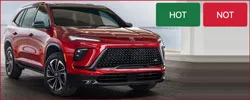I average 34 mpg on freeway driving 68 mph on cruise control. This average is based on a 100 mile drive.
That is better than the 29 or 30 mpg it's rated for. Perhaps this is partly due to my KN air filter and using mid grade gas?
What gas mileage do you get on freeway?
That is better than the 29 or 30 mpg it's rated for. Perhaps this is partly due to my KN air filter and using mid grade gas?
What gas mileage do you get on freeway?





